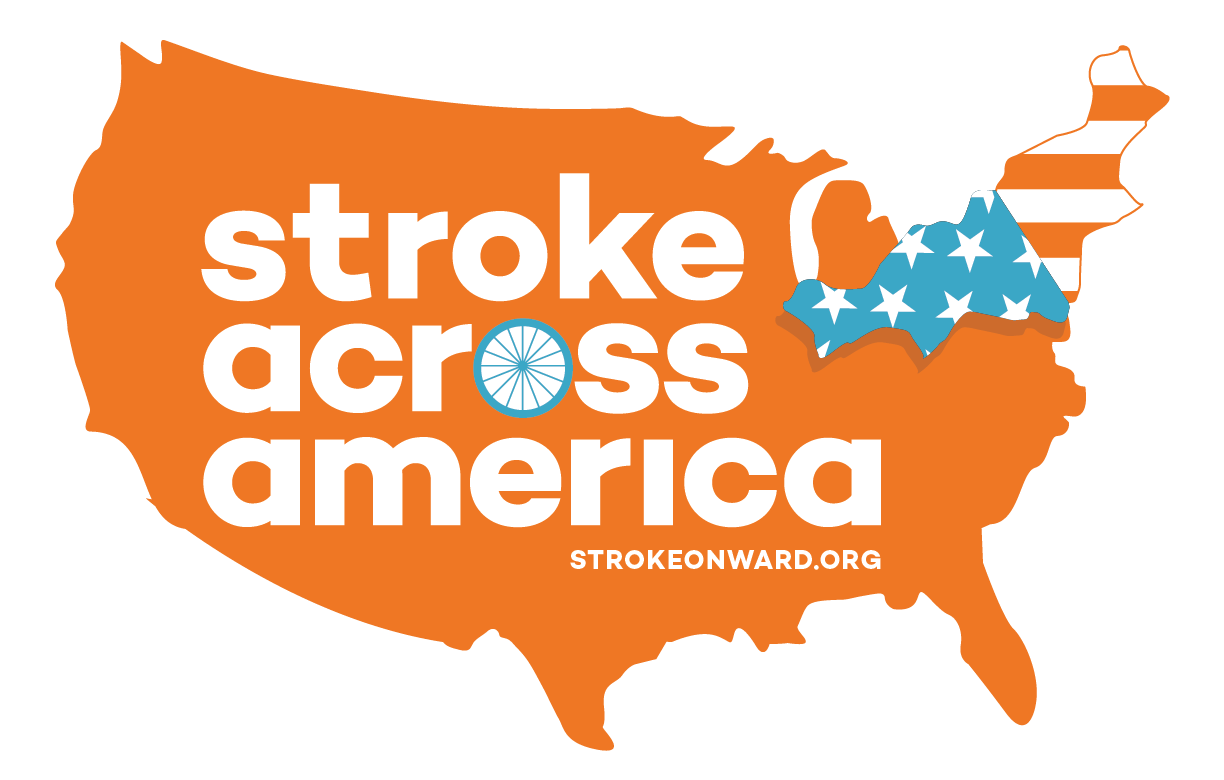
02 Mar Stroke Across America
The following article was originally published by American Stroke Association on March 2, 2022 on their website.
100 days. 4,300 miles. Almost 150,000 feet of uphill climbing.
That is our plan for Stroke Across America. From May 19 to August 26, we will ride from coast-to-coast, along with several other survivors. We’ll be on our tandem bicycle. Others will be riding conventional bikes or three-wheeled trikes from Astoria, Oregon, to Boston. It’s a ride Steve has wanted to do for decades, though he had never imagined it would be on a tandem. But now it is so much more than completing a “bucket list” adventure. It’s our effort to raise awareness about stroke, aphasia and the need to support the emotional and identity journey in recovery from trauma. This journey is also a reflection of our personal journey these past 11 years since Debra’s stroke – and a reflection of so much that we’ve written about in this column.
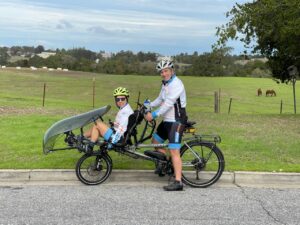
Steve and Debra conceived this adventure and are thrilled to be joined by Whitney, Joe and Michael – inspiring survivors with wonderful family support. All are eager to raise awareness for stroke, traumatic brain injury and aphasia.
Rebuilding identity
That was Debra’s key to rebuilding her life once she realized significant disabilities were here to stay and life as we knew it before the stroke would never return. Rebuilding identity meant, among other things, focusing on what was really important to her – and to us – and finding ways to keep those things in our lives. Exercise, the outdoors, travel, and doing these together in a way we both enjoy are among those things. We could no longer ski steep slopes, run 10Ks, hike mountains or ride our own bikes together. But we found tandem bike riding to be the best way for us to continue living this important part of our identities.
Adaptation and compromise
Riding a tandem is, of course, an adaptation. But it wasn’t that simple. We tried lots of different tandems. We used duct tape to experiment with positions for braces that made riding comfortable and safe for Debra. We visited an adaptive cycling program to explore new options. We took many frustrating rides on the path to finding enjoyment. We negotiated and compromised on when, how and where we ride so that it’s fun for both of us. Adaptation and compromise were part of our lives and relationship before Debra’s stroke, but they are even more important today.
Stroke is a family illness
That was the title of Chapter 9 of Identity Theft. Candidly, Debra wasn’t as eager as Steve was to make this ride a priority or such a big focus of our Stroke Onward work in 2022. But rebuilding rewarding lives after stroke is as important for care partners as it is for survivors. After all, a frustrated and resentful partner doesn’t bring the best to the role of care partner.
It’s all really hard!
Stroke recovery is hard. Rehabilitation is hard. Staying positive is hard. Navigating life with disabilities is hard – especially in a world that is, unfortunately, still not built to accommodate people with disabilities. Planning and organizing Stroke Across America is hard. Riding across the country will be hard. So many things that are worthwhile are hard. That’s one reason Debra focused on celebrating small wins in her academic work on the hard work of increasing diversity and inclusion in organizations, then brought that same concept to her own stroke recovery, Identity Theft, and to our work to support stroke survivors through Stroke Onward.
Finding purpose
We talk frequently about how hard it was for Debra to write Identity Theft while living with severe expressive aphasia – even with a lot of help. The effort put her face to face with her most frustrating disability every day. She almost quit more than once. What got her going again? Purpose. She realized how little there was to help survivors navigate the emotional journey to rebuild identities and rewarding lives. She believed the book could help people. Stroke Across America is really meaningful because it has purpose.
Join the journey
We hope you will visit our website to learn more about Stroke Across America. You will find lots of information about the journey and ways to get involved. In the coming months the site will expand to create forums for active engagement, as well as regular updates from the road.
You will be able to ride with us in your neighborhood, or even on your exercise bike, through a virtual rider program (more details will be coming soon). We are also working on other ways survivors with different interests and abilities can join the journey. We want to celebrate all the ways survivors and families are rebuilding identities and rewarding lives. That includes social interactions, volunteering, work or whatever activity is part of your journey in recovery.
If you’re an avid rider, you might consider taking a vacation on one of our five Segment Tours. If you live near or along our route, you can ride with us for part of a day or come to one of the community-building events we’re planning. Or you can simply sign up for updates and follow our progress, share news with your family and friends, and join us on social media as the journey unfolds. We’ll be posting regular updates – pictures, videos, blogs, vlogs and more – once the trip is underway.
Those of us who have been touched by stroke are best positioned to help others understand it. The more awareness we create, the more attention these issues will get. And that will help us to lessen the frequency of stroke, improve interventions that minimize disabilities, and change the stroke system of care to be more supportive of survivors and families in the decades ahead. We hope you will Join the Journey to help make that happen. We’d love to hear from you. If you have thoughts about this column, experiences you’d like to share, ideas for us to explore further, or input of any kind, please email us at connect@strokeonward.org.
Other participants in Stroke Across America
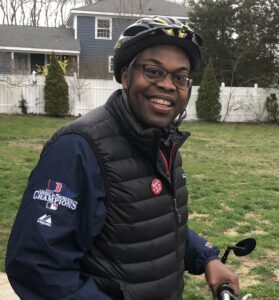
Michael Obel-Omia is an educator, poet, aphasia advocate, cyclist and stroke survivor. Riding has helped him reclaim his love of fitness and he recently published a collection of his poetry in Finding My Words: Aphasia Poetry.
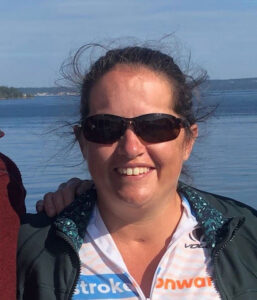
Whitney Hardy suffered a severe traumatic brain injury. This trip is part of her ongoing recovery — a physical challenge, but even more a way to push herself both cognitively and emotionally.
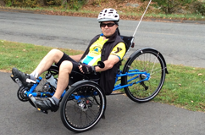
Joe Golden biked across America as a challenge for his 60th birthday – his first long ride. As a stroke survivor, he’s thrilled to be riding a trike, rebuilding a life that includes his passion for cycling.

Deb and Steve’s goldendoodle, Rusti, will be riding in a “Tail Wagon” trailer behind their tandem or in the support van. She’ll be available to all riders for a comforting cuddle whenever needed.

Sorry, the comment form is closed at this time.